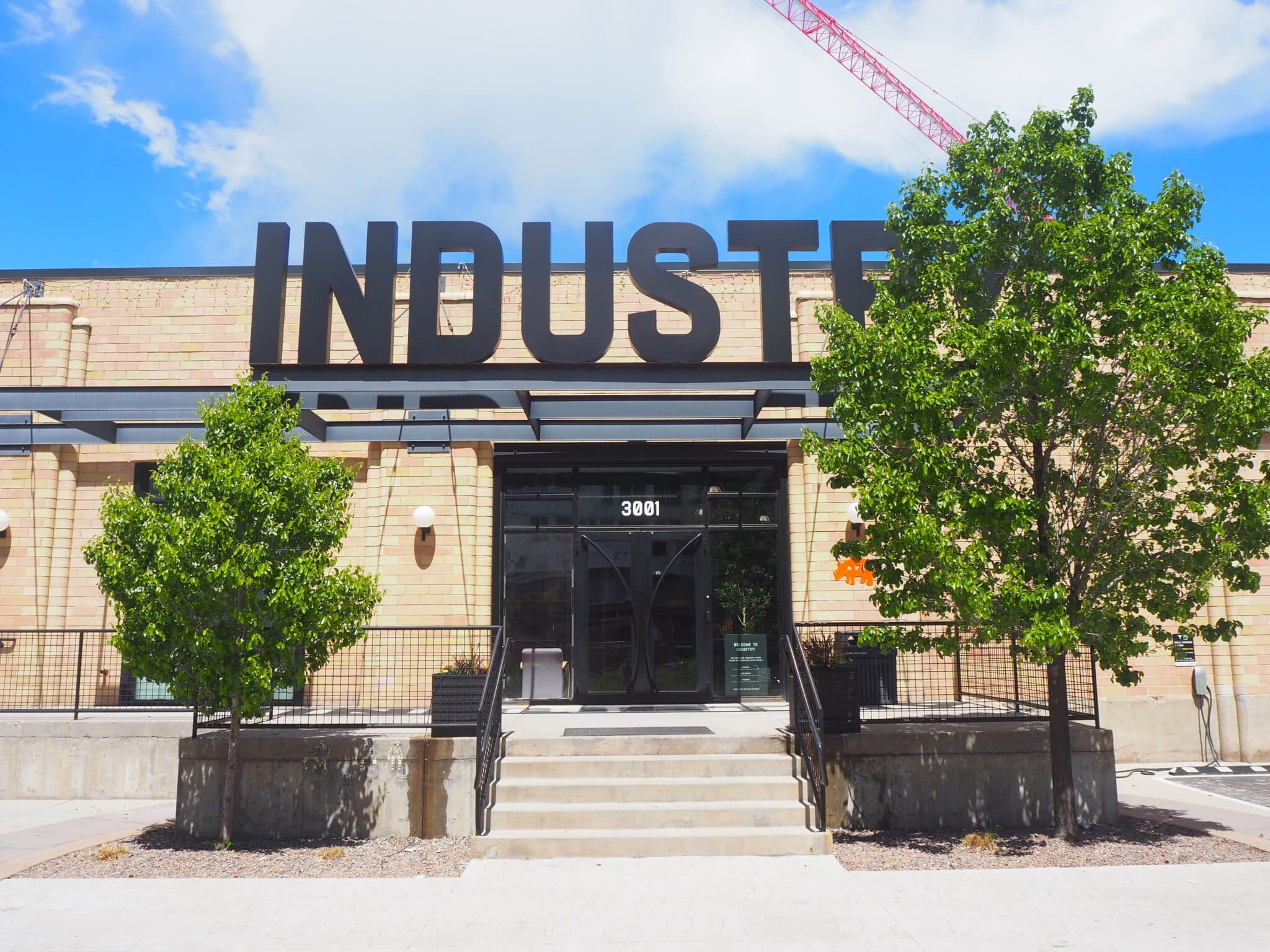
The Industry Denver building at 3001 Brighton Blvd. is for sale. (BusinessDen file)
A distressed RiNo office building has a new owner and a new name.
Boulder-based Conscience Bay Co. closed on the purchase of the 150,000-square-foot Industry Denver building at 3001 Brighton Blvd. last Wednesday, paying $19 million, according to public records.
The sale price is a third less than the seller’s loan against the building. BusinessDen broke the news in July that a sale to Conscience Bay was in the works.
Conscience Bay said Tuesday that it is rebranding the building as “Fabrica RiNo.” Ben Woolf, the company’s director of commercial real estate investments, told BusinessDen the name change is about “bringing a new sense of color and vibe” to the building.
Conscience Bay also plans to invest in amenities and common spaces, although he said it’s too early to put a dollar figure on the planned changes.
“We’re looking at options like bike storage in the building, a gym potentially — things you’d expect in other RiNo office buildings,” Woolf said.
The building was 53 percent vacant as of July, according to court records. Tenants include the restaurant chain Snooze, developer Golub & Co. and CorePower Yoga, which leases nearly 35,000 square feet for its headquarters but has sought to sublet its space.
Industry Denver was developed by a group that included Jason and Ellen Winkler, of Q Factor, and Sean Campbell and Josh Marinos, now with Formativ. The project, a mix of adaptive reuse and new construction, broke ground in 2013, and the first phase was completed the next year. It was one of the earliest projects to transform the Brighton Boulevard corridor and a pioneer in both RiNo office space and the Denver coworking scene.
In 2015, New York-based Clarion Partners — the seller in last week’s deal with Conscience Bay — took control of the property as part of a recapitalization. The next year, Clarion took out $32 million in loans on the property from New York-based American International Group, or AIG.
Last November, Clarion defaulted on the loans when it failed to pay them off upon maturity, according to court documents. At the time, the company owed nearly $29 million. A receiver was appointed for the building a short time later.
Woolf said the previous owner “got caught in Covid, and the tough debt environment, and had too much debt on it.”

Inside the building. (Courtesy Conscience Bay Co.)
“We would not have made this bet if we didn’t think the existing building had a lot of value in it,” he said.
CBRE represented the seller in last week’s deal. Conscience Bay has tapped JLL’s Jamie Roupp, Bo Pitto and Maddy Stevenson to market the office space, and Zall Co. to market one vacant retail unit. The other is home to the restaurant Will Call.
Woolf said Fabrica RiNo will offer month-to-month leases, but not day passes or hot desks as some coworking spaces do.
Conscience Bay’s main other office holding is the 530,000-square-foot campus in Longmont used by Seagate Technology. According to its website, Conscience Bay bought the property last year from Seagate, which has leased the building back for 10 years.

The Industry Denver building at 3001 Brighton Blvd. is for sale. (BusinessDen file)
A distressed RiNo office building has a new owner and a new name.
Boulder-based Conscience Bay Co. closed on the purchase of the 150,000-square-foot Industry Denver building at 3001 Brighton Blvd. last Wednesday, paying $19 million, according to public records.
The sale price is a third less than the seller’s loan against the building. BusinessDen broke the news in July that a sale to Conscience Bay was in the works.
Conscience Bay said Tuesday that it is rebranding the building as “Fabrica RiNo.” Ben Woolf, the company’s director of commercial real estate investments, told BusinessDen the name change is about “bringing a new sense of color and vibe” to the building.
Conscience Bay also plans to invest in amenities and common spaces, although he said it’s too early to put a dollar figure on the planned changes.
“We’re looking at options like bike storage in the building, a gym potentially — things you’d expect in other RiNo office buildings,” Woolf said.
The building was 53 percent vacant as of July, according to court records. Tenants include the restaurant chain Snooze, developer Golub & Co. and CorePower Yoga, which leases nearly 35,000 square feet for its headquarters but has sought to sublet its space.
Industry Denver was developed by a group that included Jason and Ellen Winkler, of Q Factor, and Sean Campbell and Josh Marinos, now with Formativ. The project, a mix of adaptive reuse and new construction, broke ground in 2013, and the first phase was completed the next year. It was one of the earliest projects to transform the Brighton Boulevard corridor and a pioneer in both RiNo office space and the Denver coworking scene.
In 2015, New York-based Clarion Partners — the seller in last week’s deal with Conscience Bay — took control of the property as part of a recapitalization. The next year, Clarion took out $32 million in loans on the property from New York-based American International Group, or AIG.
Last November, Clarion defaulted on the loans when it failed to pay them off upon maturity, according to court documents. At the time, the company owed nearly $29 million. A receiver was appointed for the building a short time later.
Woolf said the previous owner “got caught in Covid, and the tough debt environment, and had too much debt on it.”

Inside the building. (Courtesy Conscience Bay Co.)
“We would not have made this bet if we didn’t think the existing building had a lot of value in it,” he said.
CBRE represented the seller in last week’s deal. Conscience Bay has tapped JLL’s Jamie Roupp, Bo Pitto and Maddy Stevenson to market the office space, and Zall Co. to market one vacant retail unit. The other is home to the restaurant Will Call.
Woolf said Fabrica RiNo will offer month-to-month leases, but not day passes or hot desks as some coworking spaces do.
Conscience Bay’s main other office holding is the 530,000-square-foot campus in Longmont used by Seagate Technology. According to its website, Conscience Bay bought the property last year from Seagate, which has leased the building back for 10 years.
